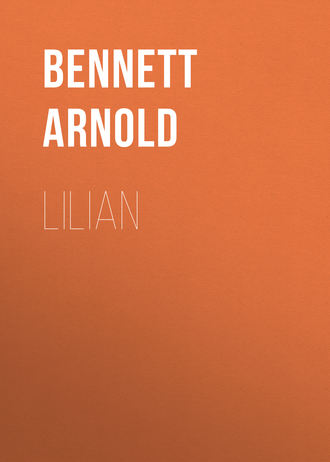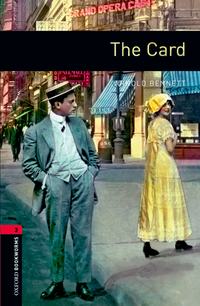 полная версия
полная версияLilian
Miss Grig ceased; only her lustrous reproachful eyes continued the harangue. She had shown no anger. She had appealed to Miss Share's best instincts.
The address "my dear Lilian" caused misgivings in the employee's bosom. Lilian knew that it was Felix and not Miss Grig who had admitted her to employment, and that Miss Grig had been somewhat opposed to the engagement. She also guessed that Miss Grig objected to her good looks, and was always watchful for an occasion to illustrate her theory that a girl might be too good-looking. And the tone of the words "my dear Lilian" had menace in its appealing, sad sweetness. Miss Grig had been known to deviate without warning into frightful inclemency, and she always implacably got the last ounce out of her girls.
The culprit offered no defence. There was no defence. Assuredly she ought to have run up on the previous evening. Miss Grig had spoken truth-the notion of running up had simply not occurred to the preoccupied Lilian. Nevertheless, while saying naught, she kept thinking resentfully: "Here I worked over twenty hours on end and this is my reward-a slating! This is my reward-a nice old slating!" With fallen face and drooping lower lip she moved to leave. She was ready to cry.
"And there's something else, Miss Share. Now please don't cry. When Mr. Grig came up the night before last to tell you that I was unwell, you ought not to have allowed him to stay. You know that he can't stand night-work. Men are not like us women-"
"But how could I possibly-" Lilian interrupted, quite forgetting the impulse to cry.
"You should have seen that he left again at once. It would have been quite easy-especially for a girl like you. The result is that he's been a wreck ever since. It seems he stayed till four o'clock and after. I tried my best to stop him from coming at all; but he would come… Please, please, think over what I've said. Thank you."
Lilian felt all the soft, cruel, unopposable force of Miss Grig's individuality. She vaguely and with inimical deference comprehended the secret of Miss Grig's success in business. Youth and beauty and charm, qualities so well appreciated by Felix, so rich in promise for Lilian, were absolutely powerless against the armour of Miss Grig. To Miss Grig Lilian was no better than a cross-eyed, flat-bosomed spinster of thirty-nine. Not a bit better! Perhaps worse! Miss Grig actually had the assurance to preach to Lilian the nauseous and unnatural doctrine that men are by right entitled to the protection and self-sacrifice of women.
Moreover, Miss Grig, without knowing it, had convinced Lilian that her ideas concerning Lord Mackworth were the hallucinations of an excessively silly and despicable kind of brain. And even if Lord Mackworth did playfully attempt to continue the divertissement begun in the romantic night, Miss Grig by the sureness of her perceptions and the bland pitilessness of her tactics would undoubtedly counter him once and for all. The two women, so acutely contrasted in age, form and temperament, had this in common-that they secretly and unwillingly respected each other. But the younger was at present no match at all for the elder.
And yet Lilian was not cast down-neither by the realization of her awful silliness and of her lack of the sense of responsibility, nor by her powerlessness, nor by the awaking from the dream of Lord Mackworth. On the contrary, she was quite uplifted and agreeably excited, and her brain was working on lines of which Miss Grig had absolutely no notion whatever. Miss Grig, obviously truthful, had said that she had tried to prevent her brother from coming to the office on the last night but one. Miss Grig had been ready enough to let Lilian stay till morning without a word. But Felix had told Lilian that he had come to the office to warn her at his sister's urgent request. Why had Felix lied?
The answer clearly was that he had had a fancy to chat with Lilian alone, without Lilian suspecting his fancy. And in fact he had chatted with Lilian alone, and to some purpose… The answer was that Felix was genuinely interested in Lilian. Further, Miss Grig suspected this interest. If Gertie Jackson had happened to be on duty that evening, would Miss Grig have opposed her brother's coming? She would not. Finally, Miss Grig herself had confessed, perhaps unthinkingly, that Lilian was not without influential attributes. The phrase "especially for a girl like you" shone in the girl's mind.
She went into the small room, which was at the moment empty. The cover had not been removed from her own machine, but the other two machines were open, and Millicent's was ammunitioned with paper. Lilian could hear Milly, who shared the small room with herself and Gertie Jackson, dividing work and giving instructions in an important, curt voice to the mere rabble of girls in the large room. To Lilian's practised sense there was throughout the office an atmosphere of nervous disturbance and unease. Mr. Grig being absent, she felt sure that before the end of the day-probably just about tea-time-the electrical fluid would concentrate itself in one spot and then explode in a tense, violent, bitter and yet only murmured scene between two of the girls in the large room-unless, of course, she herself and Millicent happened to get across one another.
She took off her things and put them in the clothes cupboard. Gertie's hat and jacket were absent, which meant that Gertie was already out somewhere on the firm's business. Millicent's precious boa was present instead of her thick scarf, which meant that Millicent was to meet at night the insufferably pert young man from the new branch of Lloyds Bank in Bond Street. The pert young man would dine Millicent at the Popular Café in Piccadilly, where for as little as five shillings two persons might have a small table to themselves, the aphrodisiac of music, and the ingenuous illusion of seeing Life with a capital. Now Lilian never connected Life with anything less than the Savoy, the Carlton, and the Ritz. Lilian had been born with a sure instinct in these high matters. She looked at the contents of the clothes-cupboard and despised them, furiously-and in particular Millicent's boa; anybody could see what that was; it would not deceive even a bank clerk. Not that Lilian possessed any article of attire to surpass the boa in intrinsic worth! She did not. But she felt no envy in regard to the boa, and indeed never envied any girl the tenth-rate-no, nor the second-rate! Her desire was for the best or nothing; she could not compromise. The neighbouring shop-windows had effectively educated her because she was capable of self-education. Millicent and Gertie actually preferred the inferior displays of Oxford Street. She gazed in froward insolence at the workroom full of stitching girls on the opposite side of the street. They were toiling as though they had been toiling for hours. Customers had not yet begun to be shown into the elegant apartment on the floor below the workrooms. Customers were probably still sipping tea in bed with a maid to help them, and some of them had certainly never been in a Tube in their lives. Yet the workgirls, seen broadly across the street, were on the average younger, prettier, daintier and more graceful than the customers. Why then…? Etc.
The upper floors of all the surrounding streets were studded with such nests of heads bent over needles. There were scores and scores of those crowded rooms, excruciatingly feminine. "Modes et Robes" – a charming vocation! You were always seeing and touching lovely stuff, laces, feathers and confections of stuffs. A far more attractive occupation than typewriting, Lilian thought. Sometimes she had dreamt of a change, but not seriously. To work on other women's attire, knowing that she could never rise to it herself, would have broken her heart.
Quickly she turned away from the window, still uplifted-passionately determined that one day she would enter the most renowned and exclusive arcana in Hanover Square, and not as an employee either! Then, on that day, would she please with the virtuosity of a great pianist playing the piano, then would she exert charm, then would she be angelic and divine; and when she departed there should be a murmur of conversation. She smiled her best in anticipation; her fingers ran smoothingly over her blouse.
Gertie Jackson came in and transformed the rehearsed smile into an expression of dissatisfaction and hostility far from divine; the fingers dropped as it were guiltily; and Lilian remembered all her grievances and her tragedy. Gertie Jackson's bright, pleasant, clear, drawn face showed some traces of fatigue, but no sign at all of being a martyr to the industrial system or to the despotism of individual employers. She was a tall, well-made girl of twenty-eight, and she held herself rather nicely. She was kindly, cheerful and of an agreeable temper-as placid as a bowl of milk. She loved her work, regarding it as of real importance, and she seemed to be entirely without ambition. Apparently she would be quite happy to go on altruistically typing for ever and ever, and to be cast into a typist's grave.
Lilian's attitude towards her senior colleague was in various respects critical. In the first place, the poor thing did not realize that she was growing old-already approaching the precipice of thirty! In the second place, though possessed of a good figure and face, she did nothing with these great gifts. She had no desire to be agreeable; she was agreeable unconsciously, as a bird sings; there was no merit in it. She had no coquetry, and not the slightest inclination for chic. Her clothes were "good," and bought in Upper Street, Islington; her excellent boots gave her away. She was not uninterested in men; but she did not talk about them, she twittered about them. To Lilian she had the soul of an infant. And she was too pure, too ingenuous, too kind, too conscientious; her nature lacked something fundamental, and Lilian felt but could not describe what it was-save by saying that she had no kick in either her body or her soul. In the third place, there was that terrible absence of ambition. Lilian could not understand contentment, and Gertie's contentment exasperated her. She admitted that Gertie was faultless, and yet she tremendously despised the paragon, occasionally going so far as to think of her as a cat.
And now Gertie straightened herself, stuck her chest out bravely, according to habit, and smiled a most friendly greeting. Behind the smile lay concealed no resentment against Lilian for having failed to appear on the previous evening, and no moral superiority as a first-class devotee of duty. What lay behind it, and not wholly concealed, was a grave sense of responsibility for the welfare of the business in circumstances difficult and complex.
"Have you seen Miss Grig?" she asked solemnly.
"Yes," said Lilian, with a touch of careless defiance; she supposed Gertie to be delicately announcing that Miss G. had been lying in wait for her, Lilian.
"Doesn't she look simply frightfully ill?"
"She does," admitted Lilian, who in her egotism had quite forgotten her first impression that morning of Miss G.'s face. "What is it?"
Gertie mentioned the dreadful name of one of those hidden though not shameful maladies which afflict only women-but the majority of women. The crude words sounded oddly on Gertie's prim lips. Lilian was duly impressed; she was as if intimidated. At intervals the rumour of a victim of that class of diseases runs whisperingly through assemblages of women, who on the entrance of a male hastily change the subject of talk and become falsely bright. Yet every male in the circle of acquaintances will catch the rumour almost instantly, because some wife runs to inform her husband, and the husband informs all his friends.
"Who told you?" Lilian demanded.
"Oh! I've known about it for a long time," said Gertie without pride. "I told Milly just now, before I went out. Everybody will know soon." Lilian felt a pang of jealousy. "It means a terrible operation," Gertie added.
"But she oughtn't to be here!" Lilian exclaimed.
"No!" Gertie agreed with a surprising sternness that somewhat altered Lilian's estimate of her. "No! And she isn't going to be here, either! Not if I know it! I shall see that she gets back home at lunch-time. She's quarrelled already with Mr. Grig this morning about her coming up."
"Do you mean at home they quarrelled?"
"Yes. He got so angry that he said if she came he wouldn't. He was quite right to be angry, of course. But she came all the same."
"Miss G. must have told Gertie all that herself," Lilian reflected. "She'd never be as confidential with me. She'd never tell me anything!" And she had a queer feeling of inferiority.
"We must do all we can to help things," said Gertie.
"Of course!" agreed Lilian, suddenly softened, overcome by a rush of sympathy and a strong impulse to behave nobly, beautifully, forgivingly towards Miss G.
Nevertheless, though it was Gertie's attitude that had helped to inspire her, she still rather disdained the virtuous senior. Lilian appreciated profoundly-perhaps without being able to put her feeling into words-the heroic madness of Miss G. in defying common sense and her brother for the sake of the beloved business. But Gertie saw in Miss G.'s act nothing but a piece of naughty and sick foolishness. To Lilian Miss G. in her superficial yearning softness became almost a terrible figure, a figure to be regarded with awe, and to serve as an exemplar. But in contemplating Miss G. Lilian uneasily realized her own precariousness. Miss G. was old and plain (save that her eyes had beauty), and yet was fulfilling her great passion and was imposing herself on her environment. Miss G. was doing. Lilian could only be; she would always remain at the mercy of someone, and the success which she desired could last probably no longer than her youth and beauty. The transience of the gifts upon which she must depend frightened her-but at the same time intensified anew her resolves. She had not a moment to lose. And Gertie, standing there close to her, sweet and reliable and good, in the dull cage, amid the daily circumstances of their common slavery, would have understood nothing of Lilian's obscure emotion.
III
Shut
The two girls had not settled to work when the door of the small room was pushed cautiously open and Mr. Grig came in-as it were by stealth. Milly, prolonging her sweet hour of authority in the large room, had not yet returned to her mates. By a glance and a gesture Mr. Grig prevented the girls from any exclamation of surprise. Evidently he was secreting himself from his sister, and he must have entered the office without a sound. He looked older, worn, worried, captious-as though he needed balm and solace and treatment at once firm and infinitely soft. Lilian, who a few minutes earlier had been recalcitrant to Miss Grig's theory that women must protect men, now felt a desire to protect Mr. Grig, to save him exquisitely from anxieties unsuited to his temperament.
He shut the door, and in the intimacy of the room faced the two girls, one so devoted, the other perhaps equally devoted but whose devotion was outshone by her brilliant beauty. For him both typists were very young, but they were both women, familiar beings whom the crisis had transformed from typists into angels of succour; and he had ceased to be an employer and become a man who demanded the aid of women and knew how to rend their hearts.
"Is she in there?" he snapped, with a movement of the head towards the principals' room.
"Yes," breathed Lilian.
"Yes," said Gertie. "Oh! Mr. Grig, she ought never to have come out in her state!"
"Well, God damn it, of course she oughtn't!" retorted Mr. Grig. His language, unprecedented in that room, ought to have shocked the respectable girls, but did not in the slightest degree. To judge from their demeanour they might have been living all their lives in an environment of blasphemous profanity. "Didn't I do everything I could to keep her at home?"
"Oh! I know you did!" Gertie agreed sympathetically. "She told me."
"I made a hades of a row with her about it in the hope of keeping her in the house. But it was no use. I swore I wouldn't move until she returned. But of course I've got to do something. Look here, one of you must go to her and tell her I'm waiting in a taxi downstairs to take her home, and that I shall stick in it till she gives way, even if I'm there all day. That ought to shift her. Tell her I've arranged for the doctor to be at the house at a quarter to eleven. You'd better go and do it, Miss Jackson. She's more likely to listen to you."
"Yes, do, Gertie! You go," Lilian seconded the instruction. Then: "What's the matter, Gertie? What on earth's the matter?"
The paragon had suddenly blanched and she seemed to shiver: first sign of acute emotion that Lilian had ever observed in the placid creature.
"It's nothing. I'm only- It's really nothing."
And Gertie, who had not taken off her street-things, rose resolutely from her chair. She, who a little earlier had seemed quite energetic and fairly fresh after her night's work, now looked genuinely ill.
"You go along," Mr. Grig urged her, ruthlessly ignoring the symptoms which had startled Lilian. "And mind how you do it, there's a good creature. I'll get downstairs first." And he stepped out of the room.
The door opening showed tall, thin Millicent returning to her own work. Mr. Grig pushed past her on tiptoe. As soon as Gertie had disappeared on her mission into the principals' room, Lilian told Millicent, not without an air of superiority, as of an Under-secretary of State to a common member of Parliament, what was occurring. Millicent, who loved "incidents," bit her lips in a kind of cruel pleasure. (She had a long, straight, absolutely regular nose, and was born to accomplish the domestic infelicity of some male clerk.) She made an excuse to revisit the large room in order to spread the thrilling news.
Lilian stood just behind the still open door of the small room. A long time elapsed. Then the door of the principals' room opened, and Lilian, discreetly peeping, saw the backs of Miss Grig and Gertie Jackson. They seemed to be supporting each other in their progress towards the outer door. She wondered what the expressions on their faces might be; she had no clue to the tenor of the scene which had ended in Gertie's success, for neither of the pair spoke a word. How had Gertie managed to beat the old fanatic?
After a little pause she went to the window and opened it and looked out at the pavement below. The taxi was there. Two foreshortened figures emerged from the building. Mr. Grig emerged from the taxi. Miss Grig was induced into the vehicle, and to Lilian's astonishment Gertie followed her. Mr. Grig entered last. As the taxi swerved away, a little outcry of voices drew Lilian's attention to the fact that both windows of the large room were open and full of clusters of heads. The entire office, thanks to that lath, Millicent, was disorganized. Lilian whipped in her own head like lightning.
At three o'clock she was summoned to the telephone. Mr. Grig was speaking from a call-office.
"Miss Jackson's got influenza, the doctor says," he announced grimly. "So she has to stay here. A nice handful for me. You'd better carry on. I'll try to come up later. Miss Grig said something about some accounts-I don't know."
Lilian, quite unable to check a feeling of intense, excited happiness, replied with soothing, eager sympathy and allegiance, and went with dignity into the principals' room, now for the moment lawfully at her mercy. The accounts of the establishment were always done by Miss Grig, and there was evidence on the desk that she had been obdurately at work on bills when Gertie Jackson enticed her away. In the evening Lilian, after a day's urgent toil at her machine, was sitting in Miss Grig's chair in the principals' room, at grips with the day-book, the night-book, the ledger and some bill-forms. Although experiencing some of the sensations of a traveller lost in a forest (of which the trees were numerals), she was saturated with bliss. She had dismissed the rest of the staff at the usual hour, firmly refusing to let anybody remain with her. Almost as a favour Millicent had been permitted to purchase a night's food for her.
Just as the clock of St. George's struck eight, it occurred to her that to allow herself to be found by Mr. Grig in the occupation of Miss Grig's place might amount to a grave failure in tact; and hastily-for he might arrive at any moment-she removed all the essential paraphernalia to the small room. She had heard nothing further from Mr. Grig, who, moreover, had not definitely promised to come, but she was positive that he would come. However late the hour might be, he would come. She would hear the outer door open; she would hear his steps; she would see him; and he would see her, faithfully labouring all alone for him, and eager to take a whole night-watch for the second time in a week. For this hour she had made a special toilette, with much attention to her magnificent hair. She looked spick-and-span and enchanting.
Nor was she mistaken. Hardly had she arranged matters in her own room when the outer door did open, and she did hear his steps. The divine moment had arrived. He appeared in the doorway of the room. Rather to her regret he was not in evening dress. (But how could he be?) Still, he had a marvellous charm and his expression was less worried. He was almost too good to be true. She greeted him with a smile that combined sorrow and sympathy and welcome, fidelity and womanly comprehension, the expert assistant and the beautiful young Eve. She was so discomposed by the happiness of realization that at first she scarcely knew what either of them was saying, and then she seemed to come to herself and she caught Mr. Grig's voice clearly in the middle of a sentence:'
"… with a temperature of 104. The doctor said it would be madness to send her to Islington. This sort of influenza takes you like this, it appears. I shall have it myself next… What are you supposed to be doing? Bills, eh?"
He looked hard at her, and her eyes dropped before his experienced masculine gaze. She liked him to be wrinkled and grey, to be thirty years older than herself, to be perhaps even depraved. She liked to contrast her innocent freshness with his worn maturity. She liked it that he had not shown the slightest appreciation of her loyalty. He spoke only vaguely of Miss Grig's condition; it was not a topic meet for discussion between them, and with a few murmured monosyllables she let it drop.
"I do hope you aren't thinking of staying, Mr. Grig," she said next. "I shall be perfectly all right by myself, and the bills will occupy me till something comes in."
"I'm not going to stay. Neither are you," replied Mr. Grig curtly. "We'll shut the place up."
Her face fell.
"But-"
"We'll shut up for to-night."
"But we're supposed to be always open! Supposing some work does come in! It always does-"
"No doubt. But we're going to shut up the place-at once." There was fatigue in his voice.
Tears came into Lilian's eyes. She had expected him, in answer to her appeal to him to depart, to insist on staying with her. She had been waiting for heaven to unfold. And now he had decided to break the sacred tradition and close the office. She could not master her tears.
"Don't worry," he said in tones suddenly charged with tenderness and sympathetic understanding. "It can't be helped. I know just how you feel, and don't you imagine I don't. You've been splendid. But I had to promise Isabel I'd shut the office to-night. She's in a very bad state, and I did it to soothe her. You know she hates me to be here at nights-thinks I'm not strong enough for it."
"That's not her reason to-night," said Lilian to herself. "I know her reason to-night well enough!"
But she gave Mr. Grig a look grateful for his exquisite compassion, which had raised him in her sight to primacy among men.
Obediently she let herself be dismissed first, leaving him behind, but in the street she looked up at her window. The words "Open day and night" on the blind were no longer silhouetted against a light within. The tradition was broken. On the way to the Dover Street Tube she did not once glance behind her to see if he was following.
IV
The Vizier
Late in the afternoon of the following day Mr. Grig put his head inside the small room.









